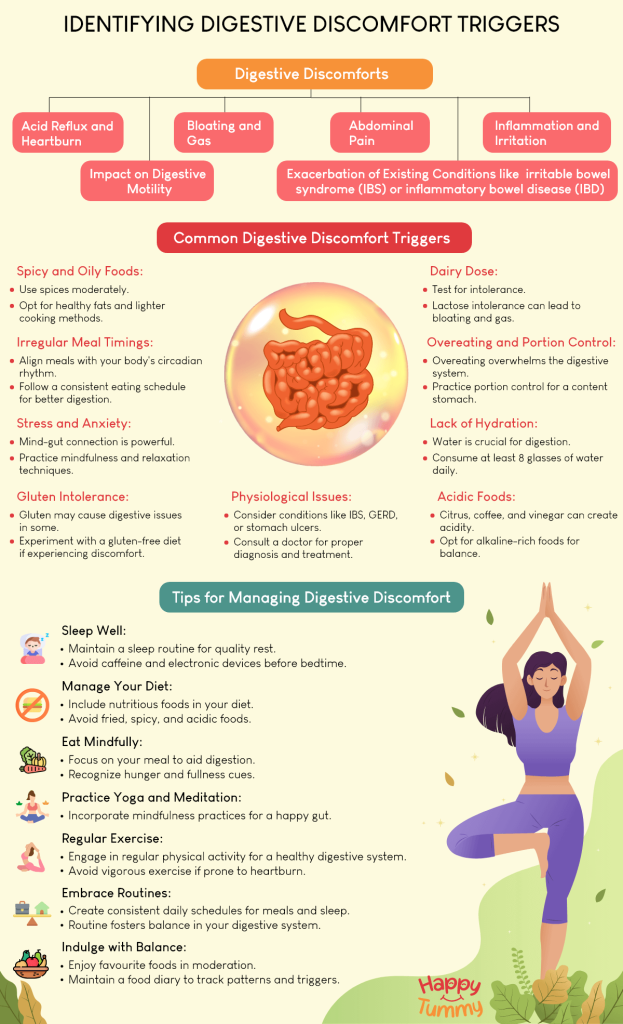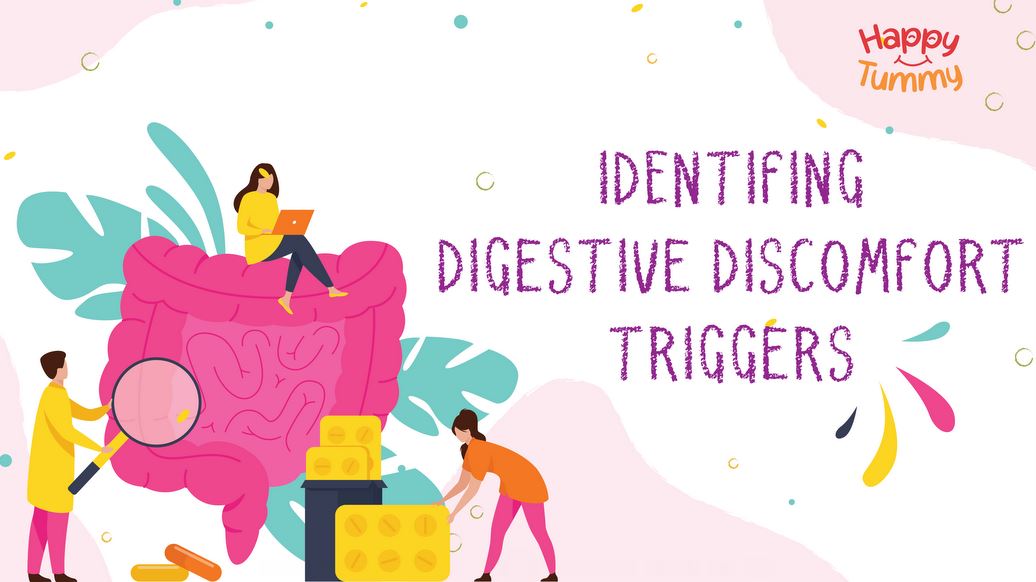Table of Contents
Do you use these terms regularly in your life?
- Acid Reflux and Heartburn
- Bloating and Gas
- Abdominal Pain
- Inflammation and Irritation
- Impact on Digestive Motility
- Exacerbation of Existing Conditions like irritable bowel syndrome (IBS) or inflammatory bowel disease (IBD)
Well, these are some of the digestive discomforts we face. We have all had days when everything is going well, but our gut doesn’t feel the same.
Digestive discomfort can be elusive, and its triggers are diverse.
Digestive health decides the quality of our lives. But sometimes the healthy streak gets derailed and we face digestive issues. What if these painful happenings could be averted?
Most digestive issues occur due to terrible eating habits. Identifying digestive discomfort triggers saves us from those painful days and helps us enhance our gut health and overall well-being.
Here is a guide to identifying eating triggers seasoned with some healthy tips to manage and avoid them.
1. Common Digestive Discomfort Triggers
Most gut issues can be traced back to a few bad food choices in the past.
For example, munching on that super-oily spicy kebab, even though we know how hurtful it could be. However, there are many reasons for digestive discomfort. Here is the list:
Spicy and Oily Foods
A lot of debates go on around spices. Where one section lauds its healthy side, another section shouts its detestation about it. But the truth lies somewhere else.
Too much of spices and oils are never loved by our guts. But we always say spices are healthy and should always add them to our healthy diet plans.
Don’t worry about wondering what to do then.
Spices are the two-faced guys. They do help, but they do burn too.
A study found that those consuming too much spicy savouries were almost 3 times more likely to have indigestion and heartburn issues as compared to those who ran away from it. However, some studies prove their health potential. The secret lies in the balance. [1][2]
How to use them?
Always use spices in moderation, and for issues they help with. For example, spices like ginger and black pepper enhance immunity and aid digestion; however, consuming too much proves otherwise. [3]
When it comes to fat, keep it low as well. The high-fat content and intense flavours can easily irritate the digestive tract. It is not made to handle this ferocious combo.
But Fear not. You can still enjoy flavorful meals by opting for lighter cooking methods and embracing digestive-friendly spices.
Health Tip: Go for healthy fats (monounsaturated and polyunsaturated fats), limit saturated fat, and avoid the unhealthy ones (trans fats). What we mean is eat:
- Nuts, seeds, cold-pressed oils (olive, canola, soybean, etc.), fatty fish, avocadoes, pure ghee, etc.,
- And avoid fried items, processed food, biscuits, baked foods, too much sugar and dairy products, etc.

2. Irregular Meal Timings
We cannot emphasize this more. Timing is everything, be it the stock market or our eating schedule. Too late or too early should be avoided. Here is why:
The human body holds a natural clock that works according to the rise and fall of the sun and moon. We call it circadian rhythm. When it sees a certain amount of natural light, certain hormones get released to trigger certain body functions.
For example, during the dawn, cortisol levels rise up to help us wake up. Our digestive system is no different.
Human digestion is well tied to the circadian rhythm and thrives on routine.
- Irregular meal timings can quickly disrupt its harmony. This is why you must have noticed feeling bloated or experiencing indigestion when you indulge in a late-night feast or consume heavy meals close to bedtime.
- Skipping meals or eating at odd hours may easily lead to bloating and digestive discomfort. In the long run, it always ruins our health. [4]
- Try having a consistent eating schedule. This is a simple yet effective strategy for promoting digestive well-being.
Lack of sleep can negatively impact gut health and create digestive issues[5]
Also read – What is the best time to eat for weight loss
3. Stress and Anxiety
You might have heard of nervous stomach, a feeling when you fail to comprehend if your stress is causing stomach discomfort or is it vice versa.
Well, it’s a two-way path where stress causes indigestion and indigestion causes stress. This pathway is referred to as mind-gut connection.
The mind-gut connection is a powerful force. Stress, specially chronic stress, plays an impactful role in this. You stand before the stage to perform and your guts start to sink in. But when this ephemeral act becomes chronic, indigestion kicks in badly.
- Chronic stress may lead to inflammation and other digestive issues. Sometimes, when undealt, the consequences turn fatal. We must combat this stress, not just for digestive health but for the overall peace in our lives.[6]
- Practice mindfulness, deep breathing, and other relaxation techniques to support a happy gut. All these things work.
Did you know that stress can even cause halitosis (bad breath)? [7]
4. Lack of Hydration
Water is life, and a lack of it is indigestion. This life’s nectar plays a crucial role in digestion. Such is its play that sometimes dehydration can even cause terrible abdominal pain. You might look for the reasons for pain in your food when it could be as simple as dehydration. It can also result in constipation and sluggish digestion as well. [8]
Water is absorbed and utilized by our body to maintain its physical functions. The calories in the water are used for essential processes, leaving no surplus energy to be stored as fat. This is why adequate water intake supports weight loss.
Another benefit of drinking water over other drinks is that beverages with added sugar and artificial sweeteners contribute more calories than plain water, potentially increasing feelings of hunger and cravings for additional snacks later. This ultimately leads to more weight gain.
In contrast, water, being flavorless and only refreshing, doesn’t stimulate repeated urges to eat and thus supports your weightloss journey.
Also read – Importance of Hydration
How to stay hydrated easily?
- Aim to drink at least 8 glasses of water per day, but individual needs may vary. Listen to your body, and drink when you feel thirsty.
- Drink a glass of lukewarm water as soon as you wake up in the morning. This helps kickstart your metabolism and replenish fluids lost during sleep.
- Keep a reusable water bottle with you throughout the day. Having water readily available makes it easier to stay hydrated, especially when you’re on the go.
- If you find plain water unappealing, try infusing it with natural flavors. Add slices of lemon, cucumber, mint, or berries to enhance the taste without adding calories or sugar.
- Drink coconut water, one of the best sources of hydration and replenishing electrolytes.
- Consume foods with high water content, such as watermelon, cucumber, celery, oranges, and strawberries. These foods can contribute to your overall fluid intake.
- Sugary drinks can contribute to digestive discomfort. Opt for water, herbal teas, or other low-calorie, hydrating options.
5. Overeating and Portion Control
It’s a toothsome truth that most of us fail to hold our reins when it comes to food. We overeat. And this overeating increases our weight and the chances of digestive discomfort. Let ‘binge eating’ be a buzzword alone. Don’t delve into it.
- Indulging in large meals can overwhelm the digestive system.
- This often means pain, discomfort, bloating, diarrhoea, vomiting, and even chronic diseases. [9]
The remedy lies in portion control. It is the key to a content stomach and a healthy weight.
All you have to do is to eat mindfully, not heartily.
Recognize your satiety cues and stop at around 80%. This practice is called ‘hara hachi bu’ and is a dear part of Japanese culture. This is also the reason behind the longer lifespan of Japanese people.
Fluctuations in temperature and humidity can trigger IBS symptoms in some people.
Also read – Tips for portion control for comfortable digestion
6. Dairy Dose
Milk and milk products sure add nutrition and delicacy to our lives, but that is not the case for everyone. There are people whose guts react otherwise when met with dairy products. The reason lies in lactose intolerance.
Some people are lactose intolerant. They lack the enzymes needed to digest lactose (the sugar found in milk). This undigested milk thus reacts and leads to painful symptoms such as bloating, gas, and diarrhoea.
How to know if you are lactose intolerant?
If you want to test your lactose intolerance at home, the test is simple – consume dairy products and wait for 30-60 minutes. If you feel some pain in your stomach, you might have it. Repeat this test a few times to be sure of it. Another way is to consult a doctor and get a hydrogen breath test done.
7. Gluten Intolerance
Similar to lactose intolerance, many people find it hard to digest gluten, too. Gluten is simply a protein that our bodies fail to digest completely. This undigested protein, when reaches the small intestines, causes issues in some people. It damages the villi there. The result?
- Skin rashes
- Nausea, abdominal cramps, indigestion, vomiting or diarrhoea
- Stuffy or runny nose
- Cough or sneezing
- Headaches
- Asthma
In some people, it can take an even more brutal turn. If you are suffering from digestive discomfort, try going gluten-free for a few days and see if you’re gluten intolerant or not.
8. Acidic Foods
Lemon, vinegar, coffee, carbonated beverages, tea, soda, all these things can create an acidic environment in your stomach. Although this alone might not seem harmful, but the impact gets multiplied when you combine them with stress, spicy foods, oily foods, etc.
You must eat healthy citrusy foods if you do not suffer from digestive discomforts. However, if you already suffer from stomach pain or acid reflux, you should avoid these. Also, look at how your body reacts to their intake. Adjust accordingly.
Instead, increase the consumption of food high in alkaline content like:
- Ridge gourd
- Beets
- Carrots
- Sweet Potato
- Brocolli
- Spinach
- Cucumbers
- Bell Peppers
- Zucchini
- Celery, etc
9. Physiological Issues
If you feel none of the above triggers to be triggering your digestive discomfort, the cause could be a physiological one. You might be suffering from one of these issues:
- IBS
- GERD / Acid Reflux / Heartburn
- Stomach Ulcers
In this case, the best advice is to see a doctor.
Tips for Managing and Avoiding Digestive Discomfort
After identifying digestive discomfort triggers, managing or completely avoiding them becomes easier. It is all about having the right knowledge now. Here are some tips to consume at least eight times a day with a glass of water each time:
1. Sleep Well
Sleep impacts our lives much more than we think. The better its quality, the more peaceful our lives are. Try to have a good night’s sleep. Here are some tips:
- Maintain a sleep routine
- Avoid light and electronic devices around 3 hours before your bedtime
- Practice sleep-time routines such as meditation, deep breathing, reading, etc.
- Avoid caffeine at least 5 hours before your bedtime
- Have light dinner
- Try calming teas like Chamomile tea, Lavender tea, Brahmi tea, etc
2. Manage Your Diet
Your diet should be nutritious: healthy proteins, complex carbs, fibre, good fat (unsaturated), vitamins, minerals, antioxidants, etc. Here are a few other tips:
- You must avoid fried foods at all costs.
- Keep yourself hydrated throughout the day (at least 8 glasses of water per day)
- Eat lots of vegetables and fruits
- Avoid spicy, oily, and acidic food items
- If you are intolerant to gluten, lactose, or something else, avoid that too
- Eat timely. Never skip your breakfast, always have your lunch at around 1 p.m., and do your dinner at least 4 hours prior to your sleep time
- Don’t indulge in untimely snacking or eating, especially late-night munching
3. Eat Mindfully
Eating mindfully shifts our focus from daily stress to the present. When we think of food while eating, our body tends to release saliva and other digestive enzymes. This leads to better digestion.
Not only does it enhance and elevate the eating experience, but it also allows us to recognize hunger and full signals. Consequently, we avoid overeating. Remember that 80% tip, hara hachi bu, eating until eight parts full.
Also read – Benefits of Mindful eating
4. Practice Yoga and Meditation
Yoga and meditation have been around us for centuries, providing us peace and calm from everyday hassles. Separate a share of your day and devote it to yoga and meditation. It improves not only digestion but overall life.[10]
Also read – Yoga poses for digestive health
5. Regular Exercise
Exercise isn’t just beneficial for physical fitness; it also aids digestion. Go out in the park or hit the gym, but do engage in regular physical activity. This will promote a healthy digestive system. Even a short daily walk can work wonders for your gut.
The aim here is not to build muscles but to make your body go through beneficial metabolic changes that benefit overall health. Make sure you do not strain your body with vigorous exercise, as it can provoke heartburn and other digestive issues. [11][12]
6. Embrace Routines
Our bodies pick up routines and adapt very well to those. Firstly, create a consistent daily schedule for meals and sleep. Trust us, it will positively influence your nights and days and digestion.
The human body predicts routine activities and then releases the required hormones for necessary functions such as eating. Regularity fosters a sense of balance. This allows your digestive system to operate smoothly.
7. Indulge, but with Balance
It is alright to cherish cheat meals sometimes. Things go wrong when we do not know when to pull the reins. The key is to find a balance that allows you to enjoy your favourite foods without compromising your digestive health.
Also, try to maintain a food diary. Tracking food intake and symptoms can help identify patterns and potential triggers.
Conclusion
Life is to live, love, and laugh. However, digestive issues stop us from doing these simple things. Identifying digestive discomfort triggers can not only help us avoid painful indigestion but also enhance our overall wellbeing.
Remember, super spicy and oily foods are a big no. Do not indulge in these. Try to limit saturated fats and avoid trans-fat at any cost. Apart from this, irregular meal timings, stress, anxiety, dehydration, overeating, lactose and gluten intolerance, and acidic foods lead to digestive discomfort as well. If you are managing all these well and yet going through abdominal pain, the issue could be much more serious. Try to consult a doctor here.
However, the wisdom lies in prevention. To avoid the terrible symptoms, try to eat your meal on time and eat mindfully. To manage stress, practice yoga, meditation, and exercise. Do it with discipline. And you’ll see your gut health and wellbeing blooming to ease.
May your belly sing with joyous burps. Bon appétit and happy tum-tum tunes!
FAQs
• Bloating: Feeling of fullness and tightness in the abdomen.
• Constipation: Infrequent bowel movements and difficulty passing stools.
• Diarrhea: Frequent, loose, or watery stools.
• Heartburn or Acid Reflux: Burning sensation in the chest due to stomach acid flowing back into the esophagus.
Digestive discomfort can arise from various factors, including:
• Food Intolerances: Inability to digest certain foods, like lactose or gluten.
• Gastrointestinal Disorders: Conditions like irritable bowel syndrome (IBS) or inflammatory bowel disease (IBD).
• Poor Diet: Consuming excessive processed foods, fats, or insufficient fiber.
• Stress: Emotional stress can impact gut function.
A healthy digestive system exhibits signs such as:
• Energy Levels: Feeling energized rather than fatigued after meals.
• Healthy Weight Maintenance: Neither significant weight loss nor gain.
• No Persistent Discomfort: Absence of bloating, gas, or abdominal pain.
• Regular Bowel Movements: Consistent and formed stools.
• Dietary Changes: Include fiber-rich foods, probiotics, and limit processed foods.
• Manage Stress: Practice relaxation techniques like meditation or yoga.
• Probiotic Supplements: Consider if advised by a healthcare professional.
• Regular Exercise: Promotes healthy digestion.
• Stay Hydrated: Water aids digestion and overall gut health.y a healthcare professional.
• Chamomile Tea: Relaxes muscles and reduces inflammation.
• Deep Breathing: Helps relax the digestive muscles.
• Ginger: A natural anti-inflammatory that eases nausea.
• Heating Pad: Applied to the abdomen for comfort.
• Peppermint Oil: Known for its soothing properties.
• Digestive Enzymes: Aid in breaking down food.
• Fiber: Promotes regular bowel movements.
• Hydration: Ensures optimal digestive function.
• Low-FODMAP Diet: Reduces intake of certain carbohydrates.
• Probiotics: Support the balance of gut bacteria.
• Coconut Oil: Rich in lauric acid, known for its antibacterial effects.
• Fermented Foods: Probiotics in fermented foods promote a healthy balance.
• Garlic: Known for its antimicrobial properties.
• Ginger: Exhibits antibacterial effects.
• Turmeric: Contains curcumin, which has antimicrobial properties.
• Fasting: Fast for a day and only drink water, detox juices or herbal teas
• Herbal Teas: Chamomile or peppermint teas can be soothing and supportive.
• Increase Water Intake: Hydration supports digestion and detoxification.















